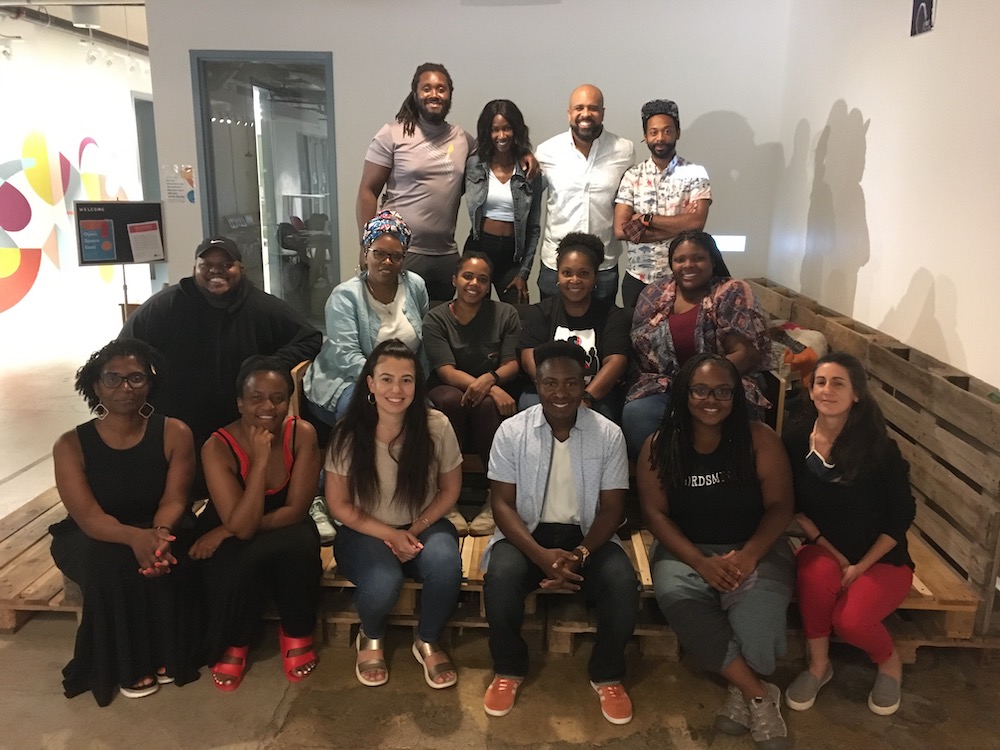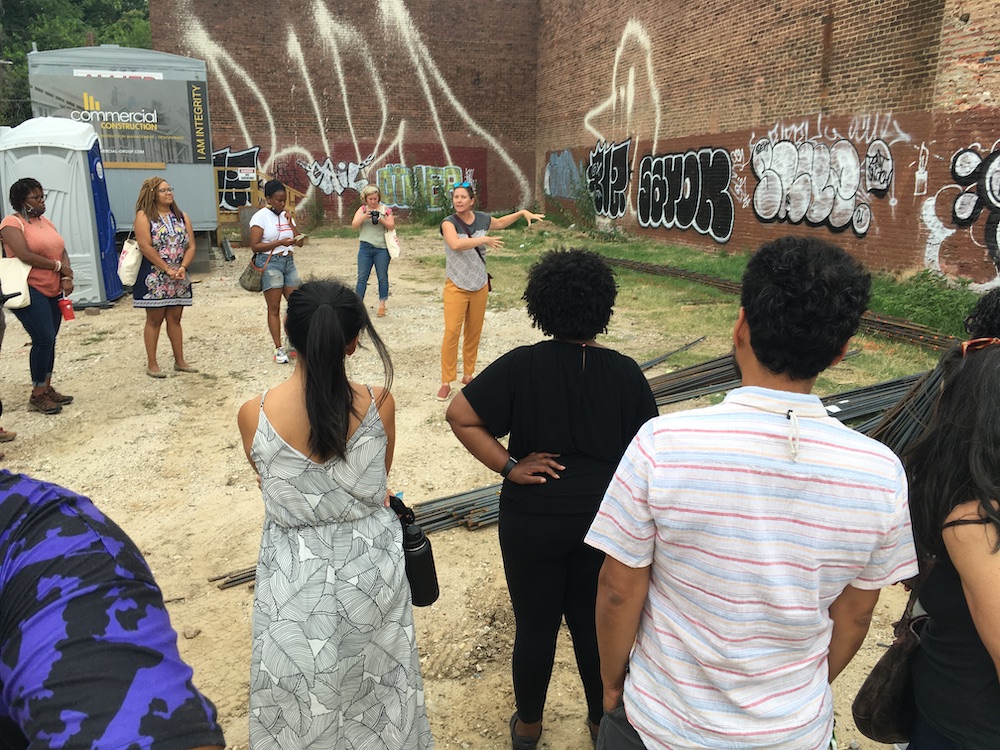This will be Made In Baltimore’s second cohort for the accelerator, which first launched in 2021. The Home-Run Accelerator is designed to help home-based entrepreneurs scale up and out into commercial production — especially women and people of color, according to Made In Baltimore Founder and Executive Director Andy Cook.
The Home-Run Accelerator is one of Made In Baltimore’s several business resources for budding entrepreneurs seeking guidance and mentorship. Technical.ly readers may have had a chance to visit Hex Superette in the Govans neighborhood, where Made In Baltimore housed its annual holiday pop-up shop. Maybe you’ve gone to one in years past? Cook said that Made in Baltimore is currently extending is presence at Hex Superette on a month-to-month basis.
Supported by the Baltimore Development Corporation (BDC), Made In Baltimore primarily operates as a business certification for members, which includes a community of makers and manufacturers. The application period for the Made In Baltimore Home-Run Accelerator closes on March 26. Those interested in learning more can check out a virtual information session this Thursday, March 9.
Cook spoke to Technical.ly about Made In Baltimore’s full scope of work, the challenges in supporting makers and small manufacturers in Baltimore City, his reflections on the Home-Run Accelerator’s first iteration, why the program has doubled in peer-mentor size, the upcoming information session and more in the Q&A below.
This conversation has been edited for length and clarity.

Did you compile any reflections from the first Home-Run Accelerator’s participants? How has that influenced this iteration?
For every program we run, we always send out a feedback survey to learn from our cohorts. We were thrilled that our participants loved the program, especially Q Ragsdale and Strategy School in the first Home-Run Accelerator. However, the most valuable advice came from our peer mentors who have started their home-based businesses and scaled them up. That’s why in 2023, we’re doubling down on peer mentorship and making it the focus of our entire curriculum. We’ve selected six peer mentors who have themselves started a home-based business and scaled it up. Those carefully selected mentors [listed on the site] will be running master classes during the eight-week program period. By doing this, we hope to provide even more hands-on, practical advice to help our cohort members achieve their goals.
For interested aspiring entrepreneurs and technologists that may need help applying, is there a way they can get technical support?
We’re hosting a virtual information session on Thursday, March 9, and anyone interested in applying can sign up using the link on the application page. The session will cover all the program details and include a Q&A. We’ll also be recording the session and posting it on our YouTube channel for those who can’t attend live. If applicants have any questions before or after the session, they can reach out to us by email using the contact information listed on our website.

Break it down for aspiring entrepreneurs and Technical.ly’s readers: What is Made In Baltimore?
Made In Baltimore is committed to supporting makers and small manufacturers in our city by growing job opportunities and businesses in the manufacturing sector. Our goal is to create sustainable, working-class jobs that pay a living wage and don’t require a college degree. While the manufacturing community may look different than it used to, we are seeing a growth in the number of small businesses working behind the scenes in various pockets of the city, thanks to initiatives such as maker spaces and ecommerce. Ultimately, our mission is to create economic opportunities for Baltimore by promoting and growing its maker economy.
We achieve our mission in three ways. I like to call them “buckets.”
What are those buckets?
The first is marketing and promotion, where we aim to share news and promote the businesses in our network through various formats such as pop-up stores, lookbooks and social media campaigns. The second bucket is business development, where we focus on skill-building and network-building for entrepreneurs. We understand that many of the business owners in our network may not come from a business background, so we offer workshops, networking events and accelerators to help fill that knowledge gap. Lastly, [we have research and policy development. Programs like] our Home-Run Accelerator [fall] under the business development category and provide entrepreneurs with the resources and support they need to grow their businesses.
Talk to us about the challenges you face with supporting makers and small manufacturers in Baltimore City.
Another example of that is we’re very aware of the impact [the] city’s zoning can have on this ability to grow. And the reality of zoning in Baltimore is that industrial zones are shrinking, they have been shrinking for decades. So it becomes more and more difficult for small businesses that don’t have unlimited budgets to buy their building and renovate buildings with aging infrastructure in the city. It becomes harder for them to find space to grow.
So Made In Baltimore is also very involved with the city’s planning department to ensure that we have more workplaces where businesses can legally operate. That came to fruition a couple of months ago, back in December, when the city passed a zoning update bill that allowed for many more businesses to now locate in more spaces — specifically, commercial spaces.
Businesses in Baltimore have been operating in an informal economy for decades, whether it be street peddlers with oils, wares or apparel. Why should a business in a less formal economy become a member of Made In Baltimore or apply for the Home-Run Accelerator?
Many businesses operate in the informal economy, which is less formal and more under the radar. However, this becomes a challenge when a business wants to grow and hire employees. To do that, they need to have some kind of legal entity. During the pandemic, we saw that to access government support or other types of resources, businesses needed to have their legal and financial affairs in order. BDC participated in efforts to help businesses access COVID relief funds, and one of the main barriers was that many businesses weren’t formalized. Being formalized can help businesses access more resources for support and growth.
Are there any notable local partners that support Made In Baltimore?
Alongside things like our certification and our Home-Run Accelerator program, we’re also focused on expanding our retail presence in the city to create more revenue opportunities for our members. We recently partnered with the National Aquarium, which now carries products made by our members in their gift shop. We’re excited to continue growing that relationship this year, as well as establishing partnerships with other institutional gift shops around the city.
How do you ensure that you’re creating a healthy environment for these businesses to thrive?
Every year, we conduct an annual member survey where we gather essential information about our members’ businesses, including their revenue, employment, and space occupancy, as well as their needs, challenges, and opportunities. We use these findings to develop our digital approach programs and policy recommendations, such as our accelerators. For instance, our survey revealed that approximately 35% of our members operated their businesses from home, and almost 90% of that group were women or people of color. This finding highlights the barrier to the growth experienced by this group due to their home-based operations.
Are there any prior cohort members who have used their time with Made In Baltimore to build out something tech related?
When it comes to tech products, I can’t think of any program that doesn’t utilize technology heavily in its work. All of the participants, across the board, do e-commerce. As part of the Home-Run Accelerator, each participant will receive up to $5,000 at the beginning of the program specifically to improve their e-commerce activities. The idea is to supercharge their online activities before they move into a physical space and increase their overhead costs. Most of them are already selling online and in person at vendor fairs, but we want to help them increase their capacity to take on additional overhead. That’s the purpose of the e-commerce awards. While many of them use platforms like Shopify, Big Cartel, and Etsy, they’re also building other things.
Do any members of Made In Baltimore stand out to you who have used tech to scale their business?
While we didn’t have direct involvement in this, we’re thrilled about the new loyalty app launched by Taharka Brothers Ice Cream. The app provides special offers, promos and discounts while also giving valuable insights to Taharka Brothers about their customers’ needs. We believe this is a great way for companies like Taharka Brothers to better understand their customers and create products tailored to their needs. We’re closely monitoring this development and are excited about the potential benefits it could bring to our other members in the future.







